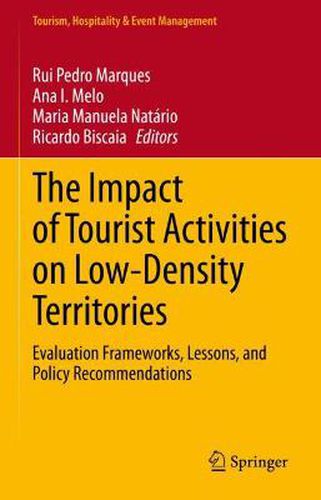Readings Newsletter
Become a Readings Member to make your shopping experience even easier.
Sign in or sign up for free!
You’re not far away from qualifying for FREE standard shipping within Australia
You’ve qualified for FREE standard shipping within Australia
The cart is loading…






This title is printed to order. This book may have been self-published. If so, we cannot guarantee the quality of the content. In the main most books will have gone through the editing process however some may not. We therefore suggest that you be aware of this before ordering this book. If in doubt check either the author or publisher’s details as we are unable to accept any returns unless they are faulty. Please contact us if you have any questions.
This book tackles the question of how tourism development and suitable policies can be used to promote sustainable development in Low-Density Territories (LDTs). The respective chapters, written by prominent experts, identify the problems associated with LDTs; highlight the comparative advantages of these territories with regard to tourism; propose methodologies for assessing the impact of tourism; and present case studies on the application of sustainable policies in tourism. Given its scope, it will be especially interesting for academics and researchers investigating LDTs and sustainable tourism, and for policymakers interested in developing these territories.
LDTs represent an economic challenge, especially because most of them are home to an increasingly ageing population unable to pursue economic development. In these territories, tourism is emerging as an excellent opportunity to promote innovative dynamics, to lure investment, and to attract new people. However, it is important to promote sustainable tourism, which preserves the environment and communities’ quality of life.
The Chapter Tourism, immigrants and lifestyle entrepreneurship: The (In)coming of people as a key factor for sustainability of low-density territories - A case study in Portugal is available open access under a Creative Commons Attribution 4.0 International License via link.springer.com.
$9.00 standard shipping within Australia
FREE standard shipping within Australia for orders over $100.00
Express & International shipping calculated at checkout
This title is printed to order. This book may have been self-published. If so, we cannot guarantee the quality of the content. In the main most books will have gone through the editing process however some may not. We therefore suggest that you be aware of this before ordering this book. If in doubt check either the author or publisher’s details as we are unable to accept any returns unless they are faulty. Please contact us if you have any questions.
This book tackles the question of how tourism development and suitable policies can be used to promote sustainable development in Low-Density Territories (LDTs). The respective chapters, written by prominent experts, identify the problems associated with LDTs; highlight the comparative advantages of these territories with regard to tourism; propose methodologies for assessing the impact of tourism; and present case studies on the application of sustainable policies in tourism. Given its scope, it will be especially interesting for academics and researchers investigating LDTs and sustainable tourism, and for policymakers interested in developing these territories.
LDTs represent an economic challenge, especially because most of them are home to an increasingly ageing population unable to pursue economic development. In these territories, tourism is emerging as an excellent opportunity to promote innovative dynamics, to lure investment, and to attract new people. However, it is important to promote sustainable tourism, which preserves the environment and communities’ quality of life.
The Chapter Tourism, immigrants and lifestyle entrepreneurship: The (In)coming of people as a key factor for sustainability of low-density territories - A case study in Portugal is available open access under a Creative Commons Attribution 4.0 International License via link.springer.com.